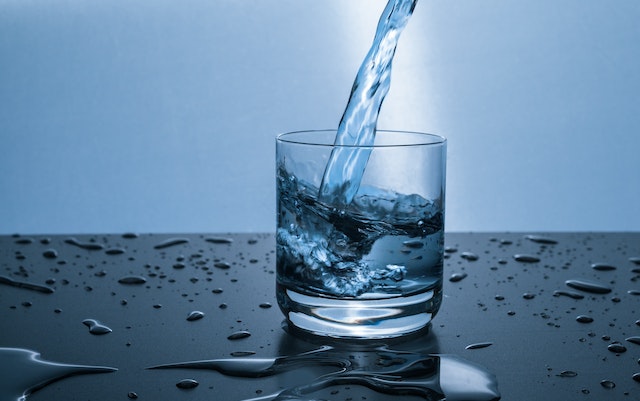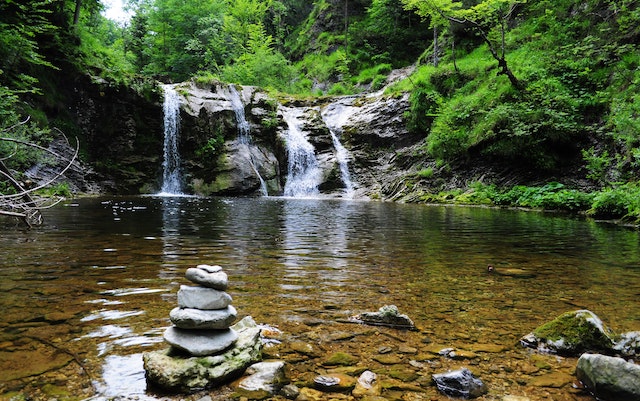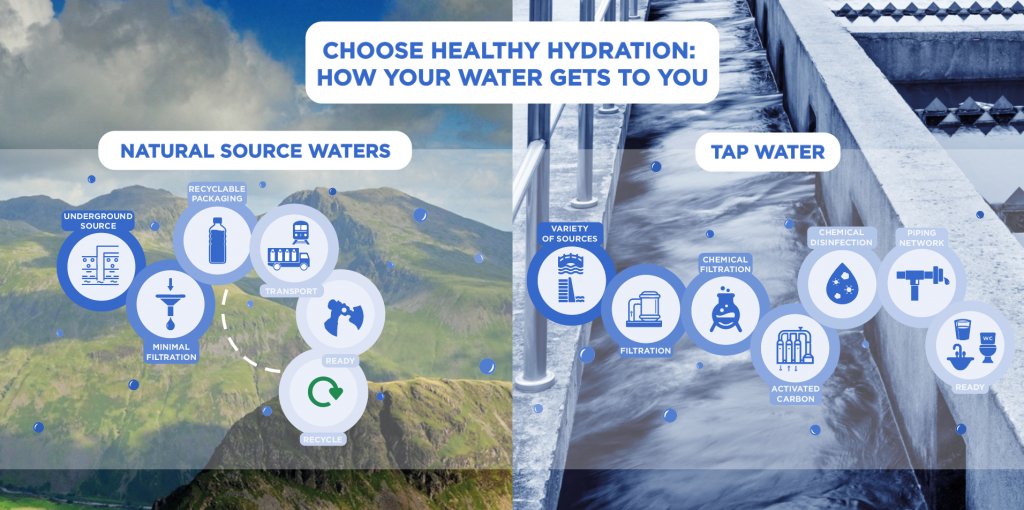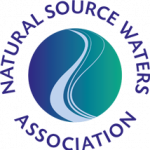Natural source and tap water


What are the differences between natural source waters and tap (municipal) water?
Natural source water comes from protected, natural underground sources. Each natural source water has a unique character and composition. The rock strata within each aquifer determines the mineral composition of the water that passes through it, which explains why there are so many different naturally sourced bottled waters. All natural source waters have to be safe to drink at source as they cannot be chemically treated and are bottled at source. Tap water can come from a wide range of sources but it is heavily processed and chemically treated to ensure its safety. It needs to contain chlorine, so it can travel safely from the water treatment works to the tap, and therefore requires a different set of regulations.
Both natural source waters and tap water are safe to drink and are healthy choices. There are a number of reasons why people opt for a bottle of natural source water when tap is available, some prefer the taste while others like the fact that it comes from a protected, underground source and has not been chemically treated.
What treatment do natural source waters and tap water undergo?
Natural source waters have to be safe to drink as they come out of the ground, they cannot be chemically treated. Tap water is heavily processed and undergoes a multistep process to make sure it is safe to drink as it comes out of the tap. . It needs to dosed with chlorine, so it can travel safely from the water treatment works to the tap, and therefore requires a different set of regulations to ensure its safety.
Both natural source waters and tap water are safe to drink and are healthy choices. There are a number of reasons why people opt for a bottle of natural source water when tap is available, some prefer the taste while others like the fact that it comes from a protected, underground source and has not been chemically treated.
What happens to water before you drink it?
Natural source waters:
- Abstraction of water that is safe to drink from protected underground source
- Screening/filtration to remove particles
- Bottled/packaged
- Ready for consumption.
Tap (municipal) water:
- Abstraction of raw water from a mix of underground and surface sources
- Storage in reservoir
- Screening/filtration to remove particles
- Chemical coagulation, flocculation and clarification to remove fine particles not present in natural source waters
- Aeration using Granular Activated Carbon (GAC) to remove odours and nitrates
- Disinfection (using chlorine, and possibly ozone dosing andammonisation) to kill bacteria
- Ready for consumption

Are natural source waters and tap water both completely safe to drink?
Yes. The treatment processes for natural source waters and tap water may differ but they are both completely safe to drink. As they have different treatment process, they undergo different safety checks as well but both ensure that the final product is completely safe.
Natural source waters are classified as a food product and have to be tested regularly at the source, during bottling, and before leaving the bottling plant. As such, they must comply with strict EU and national food safety requirements, as well as industry guides to good hygiene and manufacturing practices. They have to be frequently tested at the ingredient level (the source) and finished product level (bottles, cans or cartons) and cannot be released for sale until the results for each batch show they are safe for human consumption. Because of the food specificity of natural source waters, the frequency of controls prior, during and after the production are high. This means natural source waters are subject to a significant number of individual tests, amounting to hundreds or thousands of tests each year for every brand of natural source water sold in the UK.
Tap water can come from a wide range of sources but it is heavily processed and chemically treated to ensure its safety. It needs to contain chlorine, so it can travel safely from the water treatment works to the tap, and therefore requires a different set of regulations.
Do natural source waters have any additional health benefits over tap water?
Plain water is the healthiest way to hydrate, whether you choose to drink natural source waters or tap waters. Relatively few natural source waters are very highly mineralised and therefore may have additional health benefits but also a stronger taste. People choose natural source waters for a number of reasons including that they are not chemically treated, they come from a protected source or simply that they prefer the taste.
What does using a water filter do?
Using a water filter at home is a scaled down version of the aeration using granular activated charcoal already carried out by the utility company as part of the multi-step process they employ to make it safe to drink. As a result the filter is only likely remove the some of the chemicals added by the utility company after this process to disinfect the water or some of what the water may have picked up as it travels down the pipes to your tap. It will not be able to turn it into natural mineral or spring water.


